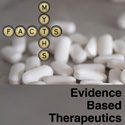Episode 31: Old Ideas for Coping with New Drugs
In our 31st episode we offer an approach to new drugs. We look at the last five years of new product introduction and consider the frequency of new drugs being truly novel and a substantial addition. We examine how medicines termed “new” are frequently modifications that make no measurable change in the product. Finally, we consider a basic approach to new products. James gets militant on the theme (but not the message) while Mike runs for cover.
Show Notes
1) Number of drugs considered to be a “substantial” improvement – 2001 to 2007 – category 2 is considered substantial improvement (14 out of 147) PMPRB 2007 Annual report 
2) Prescrire review of new drugs Can J Clin Pharmacol 2005;12:e10-e21
3) Drugs withdrawn from the Canadian market for safety reasons CMAJ 2005;172:765–7
4) Guideline recommendations are not necessarily based on “solid” evidence and are often opinion-based Example – Canadian Cardiovascular Society position statement – Recommendations for the diagnosis and treatment of dyslipidemia and prevention of cardiovascular disease
Of the 15 specific recommendations in this document:
4 were considered Level A – Data derived from multiple randomized controlled trials or meta-analyses
0 were considered Level B – Data derived from a single randomized controlled trial or large, nonrandomized studies
11 were considered Level C – Consensus of opinion by experts and/or small studies, retrospective studies or registries







